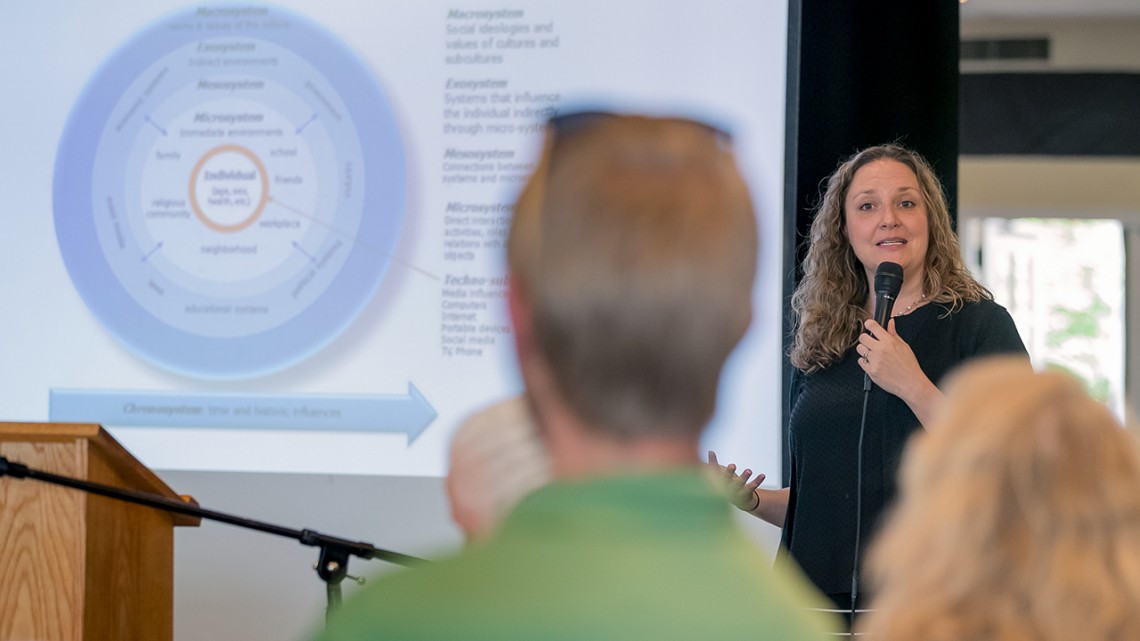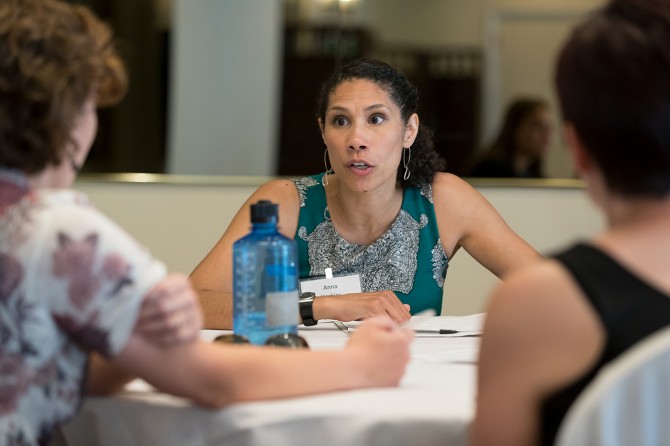
Laura Tach, associate professor of policy analysis and management and co-director of Cornell Project 2Gen, presents at the Youth Development Research Update.
Conference takes multigenerational approach to youth development
By Sheri Hall
What can youth learn through interviews with older adults? How does immigration status affect the lives of youth and their parents? Can we better design towns and cities to meet the needs of children and senior citizens? How is the opioid epidemic affecting the well-being of children and teens?
These were among the questions discussed by Cornell faculty experts, Cornell Cooperative Extension county leaders, 4-H educators and community partners at the eighth annual Youth Development Research Update, May 30-31 in Ithaca. The event is sponsored by the Program for Research on Youth Development and Engagement (PRYDE) in the Bronfenbrenner Center for Translational Research (BCTR), College of Human Ecology.
This year’s conference, “Multi-Generational Approaches to Youth Development,” focused on research and programs that reach across generations.
“The idea is to connect people who are leading and running programs in the communities with faculty so they can apply cutting-edge research to their programs,” said Jen Agans, conference organizer and assistant director of PRYDE, which sponsored the conference. “We also plan time in the conference for practitioners, who know so much about their communities, to share their knowledge with researchers.”
A prime example of this collaboration is the program Building a Community Legacy Together (BCLT). The idea began when Karl Pillemer, a gerontologist and BCTR director, began working on a book to capture the wisdom of senior citizens. Pillemer and his research assistants were incredibly moved by their interviews and wondered if they could provide the same experience to youth participating in 4-H.
Researchers for the book worked with 4-H leaders to develop a program that trains youth to conduct interviews with senior citizens from their community. After youth interview the elders, they organize the lessons they learned and create a presentation to share with their community.
Early results found the program promotes respect toward elders and combats the problem of ageism. Youth also learn valuable skills, such as interviewing and research techniques, and make meaningful connections with older member of their communities.
To date, 150 youths in New York state have participated in the program, and 4-H leaders are in the process of adding it to the national 4-H curriculum.
“Partnering with CCE educators to implement this program is exactly what translational research is all about,” said Leslie Shultz, a BCTR researcher who helped launch BCLT. “The program’s success was, in part, based on our ability to work together and adapt the program to the individual needs of each implementation team. While the core curriculum was maintained, we were able to stretch and mold the program in consideration of each community’s specific population, interests and structural resources.”
Other researchers presented on a wide variety of topics. Matthew Hall, associate professor of policy analysis and management, discussed his research showing that undocumented students are less likely to graduate from high school and enroll in college due to their immigration status.
Mildred Warner, professor of city and regional planning, talked about how city planners can make decisions about parks and recreation, neighborhood design and transportation that benefit children and older adults, and ultimately result in social and economic benefits for the community.
And Laura Tach, associate professor of policy analysis and management, discussed a new program called Cornell Project 2Gen that supports research, policy development and practice that address the needs of vulnerable children and their parents.
Stephanie Graf, CCE youth and family community program leader in Jefferson County, presented about her role in implementing BCLT – the program that teaches youth to interview elders – in her community.
“The connections between researchers and the Cooperative Extension practitioners in the field are stronger than they’ve ever been,” she said.
The conference helped practitioners to understand the data behind the work they do, she said. “We all know that children growing up in low-income families don’t have the same capacity to do well in school compared to children with higher socio-economic status,” she said. “But we learned about the data behind that.”
Sheri Hall is a freelance writer.
Media Contact
Get Cornell news delivered right to your inbox.
Subscribe

